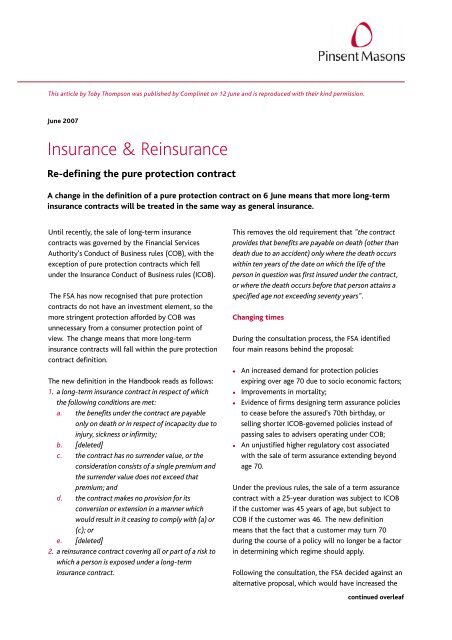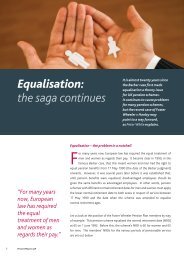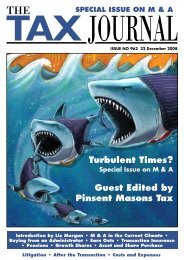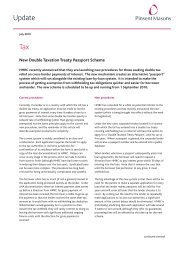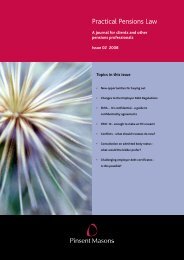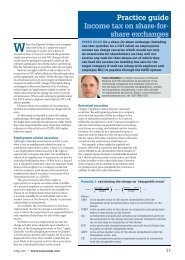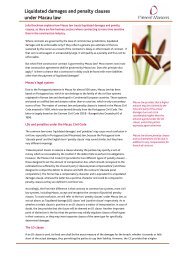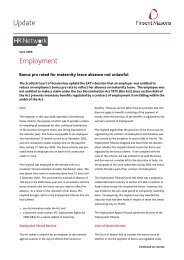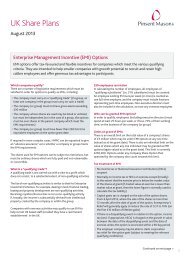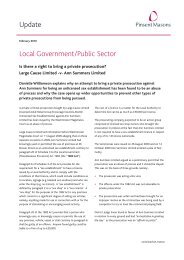Re-defining the pure protection contract - July 07 ... - Pinsent Masons
Re-defining the pure protection contract - July 07 ... - Pinsent Masons
Re-defining the pure protection contract - July 07 ... - Pinsent Masons
You also want an ePaper? Increase the reach of your titles
YUMPU automatically turns print PDFs into web optimized ePapers that Google loves.
This article by Toby Thompson was published by Complinet on 12 June and is reproduced with <strong>the</strong>ir kind permission.<br />
June 20<strong>07</strong><br />
Insurance & <strong>Re</strong>insurance<br />
<strong>Re</strong>-<strong>defining</strong> <strong>the</strong> <strong>pure</strong> <strong>protection</strong> <strong>contract</strong><br />
A change in <strong>the</strong> definition of a <strong>pure</strong> <strong>protection</strong> <strong>contract</strong> on 6 June means that more long-term<br />
insurance <strong>contract</strong>s will be treated in <strong>the</strong> same way as general insurance.<br />
Until recently, <strong>the</strong> sale of long-term insurance<br />
<strong>contract</strong>s was governed by <strong>the</strong> Financial Services<br />
Authority's Conduct of Business rules (COB), with <strong>the</strong><br />
exception of <strong>pure</strong> <strong>protection</strong> <strong>contract</strong>s which fell<br />
under <strong>the</strong> Insurance Conduct of Business rules (ICOB).<br />
The FSA has now recognised that <strong>pure</strong> <strong>protection</strong><br />
<strong>contract</strong>s do not have an investment element, so <strong>the</strong><br />
more stringent <strong>protection</strong> afforded by COB was<br />
unnecessary from a consumer <strong>protection</strong> point of<br />
view. The change means that more long-term<br />
insurance <strong>contract</strong>s will fall within <strong>the</strong> <strong>pure</strong> <strong>protection</strong><br />
<strong>contract</strong> definition.<br />
The new definition in <strong>the</strong> Handbook reads as follows:<br />
1. a long-term insurance <strong>contract</strong> in respect of which<br />
<strong>the</strong> following conditions are met:<br />
a. <strong>the</strong> benefits under <strong>the</strong> <strong>contract</strong> are payable<br />
only on death or in respect of incapacity due to<br />
injury, sickness or infirmity;<br />
b. [deleted]<br />
c. <strong>the</strong> <strong>contract</strong> has no surrender value, or <strong>the</strong><br />
consideration consists of a single premium and<br />
<strong>the</strong> surrender value does not exceed that<br />
premium; and<br />
d. <strong>the</strong> <strong>contract</strong> makes no provision for its<br />
conversion or extension in a manner which<br />
would result in it ceasing to comply with (a) or<br />
(c); or<br />
e. [deleted]<br />
2. a reinsurance <strong>contract</strong> covering all or part of a risk to<br />
which a person is exposed under a long-term<br />
insurance <strong>contract</strong>.<br />
This removes <strong>the</strong> old requirement that "<strong>the</strong> <strong>contract</strong><br />
provides that benefits are payable on death (o<strong>the</strong>r than<br />
death due to an accident) only where <strong>the</strong> death occurs<br />
within ten years of <strong>the</strong> date on which <strong>the</strong> life of <strong>the</strong><br />
person in question was first insured under <strong>the</strong> <strong>contract</strong>,<br />
or where <strong>the</strong> death occurs before that person attains a<br />
specified age not exceeding seventy years".<br />
Changing times<br />
During <strong>the</strong> consultation process, <strong>the</strong> FSA identified<br />
four main reasons behind <strong>the</strong> proposal:<br />
• An increased demand for <strong>protection</strong> policies<br />
expiring over age 70 due to socio economic factors;<br />
• Improvements in mortality;<br />
• Evidence of firms designing term assurance policies<br />
to cease before <strong>the</strong> assured's 70th birthday, or<br />
selling shorter ICOB-governed policies instead of<br />
passing sales to advisers operating under COB;<br />
• An unjustified higher regulatory cost associated<br />
with <strong>the</strong> sale of term assurance extending beyond<br />
age 70.<br />
Under <strong>the</strong> previous rules, <strong>the</strong> sale of a term assurance<br />
<strong>contract</strong> with a 25-year duration was subject to ICOB<br />
if <strong>the</strong> customer was 45 years of age, but subject to<br />
COB if <strong>the</strong> customer was 46. The new definition<br />
means that <strong>the</strong> fact that a customer may turn 70<br />
during <strong>the</strong> course of a policy will no longer be a factor<br />
in determining which regime should apply.<br />
Following <strong>the</strong> consultation, <strong>the</strong> FSA decided against an<br />
alternative proposal, which would have increased <strong>the</strong><br />
continued overleaf
age limit within <strong>the</strong> definition to 80. This, it was<br />
recognised, would merely have reduced <strong>the</strong> anomalous<br />
effect of <strong>the</strong> definition, as opposed to eliminating it<br />
altoge<strong>the</strong>r.<br />
Election provisions<br />
As a result of <strong>the</strong> consultation exercise, <strong>the</strong> FSA has<br />
also announced two fur<strong>the</strong>r changes to <strong>the</strong> Handbook.<br />
First, <strong>the</strong> provision in ICOB 1.2.17R(1), under which a<br />
firm can currently elect to sell pension term assurance<br />
policies in accordance with COB as opposed to ICOB is<br />
to be extended to include all <strong>pure</strong> <strong>protection</strong><br />
<strong>contract</strong>s. Firms will, <strong>the</strong>refore, have <strong>the</strong> option of<br />
continuing to sell <strong>the</strong> affected <strong>contract</strong>s pursuant to<br />
COB.<br />
Some firms felt that this would minimise <strong>the</strong> cost<br />
implications of <strong>the</strong> rule change. Firms taking<br />
advantage of this provision, however, will have to bear<br />
in mind that, in making <strong>the</strong> election, <strong>the</strong>y must record<br />
<strong>the</strong>ir decision and <strong>the</strong>y will be obliged to comply with<br />
<strong>the</strong> o<strong>the</strong>r Handbook provisions relevant to COB<br />
regulated sales.<br />
In addition, firms wishing to take advantage of <strong>the</strong><br />
election provisions will now have until 5 June 2008 to<br />
comply with <strong>the</strong> record-keeping requirement. This will<br />
give smaller intermediaries, who are more likely to<br />
want to make use of this option, additional time to<br />
adjust.<br />
In any event, <strong>the</strong> election provisions may not survive<br />
<strong>the</strong> FSA's ongoing review of <strong>the</strong> ICOB sourcebook. The<br />
FSA has indicated that if, as a result of <strong>the</strong> review,<br />
changes are made to <strong>the</strong> way in which <strong>pure</strong> <strong>protection</strong><br />
<strong>contract</strong>s are sold such that <strong>the</strong> ICOB regime becomes<br />
more onerous than COB, it may no longer be<br />
appropriate for firms to be able to elect to comply<br />
with COB instead.<br />
© <strong>Pinsent</strong> <strong>Masons</strong> 20<strong>07</strong><br />
This note does not constitute legal advice. Specific legal advice should be taken before acting on any of <strong>the</strong> topics covered.<br />
LONDON BIRMINGHAM BRISTOL EDINBURGH GLASGOW LEEDS MANCHESTER BEIJING BRUSSELS DUBAI HONG KONG SHANGHAI<br />
T 0845 300 32 32 www.pinsentmasons.com<br />
For fur<strong>the</strong>r information please contact Toby Thompson (toby.thompson@pinsentmasons.com), Tel: 020 7667 0266.


